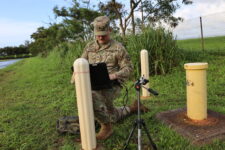
Military pay and benefits must be cut by the new congressional “super committee” as it begins its quest to find $1.2 trillion to cut from the federal budget, a panel of experienced budget experts said today.
Pushing through any package of cuts, the panel members said at the Brookings Institution, will be incredibly difficult and will require a great deal of pressure from President Obama and congressional leaders, the panel said.
The panel, which included Bill Clinton’s budget director Alice Rivlin and George Bush’s national security advisor Stephen Hadley, agreed that entitlements — Social Security and Medicare – must be cut.
Joining the two former presidential aides were Brookings national security analysts Michael O’Hanlon and Peter Singer. All four panelists said defense spending reductions must be part of the deal. Although cutting civilian entitlements and military benefits are “third rail” subjects for lawmakers at both ends of the political spectrum, Rivlin said the threat of automatically cutting defense and entitlements in the deficit deal Congress approved was designed to be “unacceptable to both sides.”
Rivlin and Hadley offered mild reviews of the 12-member committee, while Singer was flat-out gloomy over the likelihood of any agreement being reached that Congress would accept. “Based on their behavior the last few months, I don’t think that’s something we can depend on,” Singer said, referring to the prolonged and very ugly stalemate over raising the debt ceiling.
Rivlin, who said she was “the only dove” on the panel, was more comfortable with defense cuts above the $350 billion called for in the budget law. But Hadley and the two Brookings experts warned that making defense absorb most of the $1.2 trillion “sequester” cuts would have a dangerous impact on national security.
Whatever additional defense cuts are required must be based on strategy, Hadley said. “The most foolish way to do this would be 10 percent across the board,” he said.
We fed every 2024 Pentagon briefing into ChatGPT. Here’s what it thought.
The US national security establishment is cautiously embracing generative AI, so Breaking Defense decided to do an experiment.


























